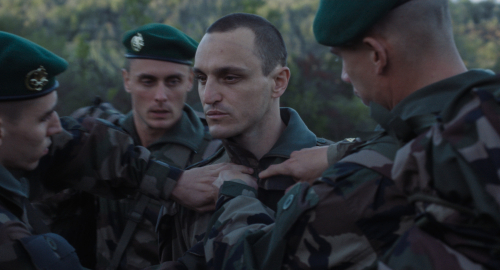
Films Grand Huit
MOVIE REVIEW
Disco Boy (2023)
Sometimes the best thing to do is just to dance. Aleksei (Franz Rogowski) got a raw deal; a Belarusian orphan doesn’t have many ways to make a better life for himself. His childhood dream with his “comrade in misfortune,” Mikhail (Michał Balicki), was to make their way to France, enlist in the Foreign Legion, and after five years depart as French citizens with French names and the slate wiped clean. But dreams can curdle into nightmares, as Aleksei finds out firsthand in the Nigerian Delta, of all places. It’s not the plot the “Disco Boy” title leads you to expect, but for writer-director Giacomo Abbruzzese that’s the point, how the expectations and prejudices of others limit your own life.
The Nigerian Delta is an oil-rich part of the world with a long history of exploitation and trouble due to its resources, as well as a lack of tolerance for any protest, peaceful or no. Jomo (Morr Ndiaye, who makes a strong impression) is the leader of a group of armed guerrillas who kidnap some French oil executives. The eternal freedom-fighter-or-terrorist? question comes into play here, not least because Jomo’s intelligence and love for his sister, Udoka (Laëtitia Ky, as usual underused), are clear. If he’d been born in the West with the whites he’d have liked to be a dancer in a nightclub; and his friend’s jokey reaction provides the movie’s title. But he is in the Nigerian jungle, recording propaganda videos for the internet and shooting off his machine gun to impress an American journalist, and encountering Aleksei in the worst possible circumstances.
The scene of their meeting is what caused cinematographer Hélène Louvart to win the Silver Bear for outstanding artistic contribution at this year’s Berlinale: She filmed it in infrared light. Between that and the pulsing score by Vitalic, the parallels between dancing and fighting are made brutally explicit, all the more so as Aleksei has to reckon with what he is becoming. Later Aleksei begins to frequent a Parisian nightclub in a disused church; it’s owned by Gavril (Robert Więckiewicz), who can read Aleksei’s tattoos and becomes a surprising ally. The question is whether the price Aleksei is paying to be accepted in France is worth it, and if he will be able to leave what happened in the Delta behind.
Mr. Abbruzzese is wrestling with the profound, frightening topics of identity, colonialism, violence, tribalism and power; and the choice to underline all this with dance and music elevates “Disco Boy” to something unusual. The casting of Mr. Rogowski was an excellent choice; he has a compelling physical presence, with an incredible gift for being in the moment and paying attention, which means you literally can’t tear your eyes away from Aleksei no matter what he’s doing. Of course this would have been much more interesting from Udoka’s point of view, not least because Ms. Ky has the magnetism to match Mr. Rogowski’s, but complaining a movie stops where it ought to have started is a little churlish. We don’t get the luxury of choosing who we are, but we are able to choose what we become, though being able to achieve that requires as much luck as skill. Mr. Abbruzzese needed a little more skill to make “Disco Boy” an all-timer, but as it is the movie leaves an exceptional impression.
Comments